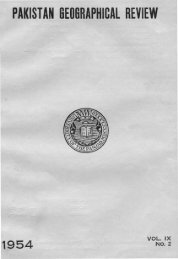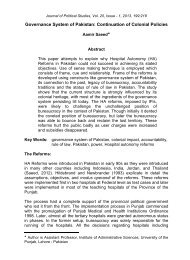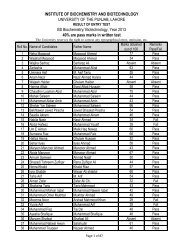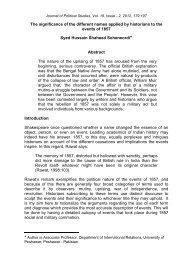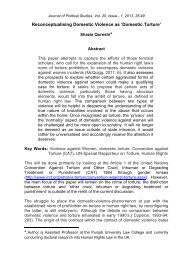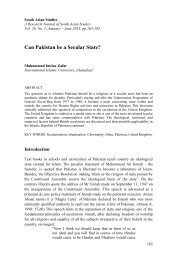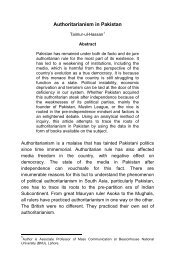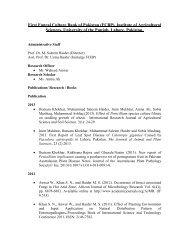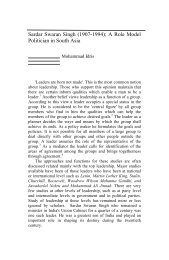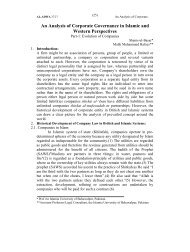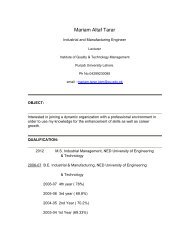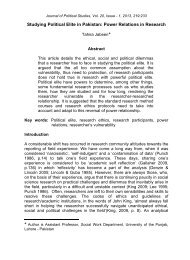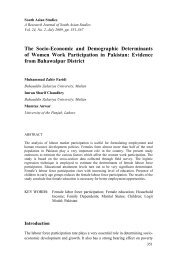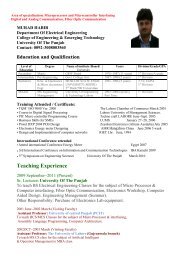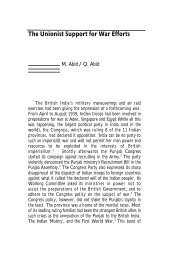4. Dr. Amir M. Haji Yousefi_January-June 2012
4. Dr. Amir M. Haji Yousefi_January-June 2012
4. Dr. Amir M. Haji Yousefi_January-June 2012
Create successful ePaper yourself
Turn your PDF publications into a flip-book with our unique Google optimized e-Paper software.
South Asian Studies 27 (1)<br />
Iranian Foreign Policy in Afghanistan since 2001<br />
The United States occupation of Afghanistan eliminated the main ideological<br />
threat to Iran. The Taliban government in Kabul was considered in Tehran as the<br />
most important enemy and security threat for the country, since it 1) strengthened<br />
Salafi and Wahabi Islamic extremism in Afghanistan which was against Iran Shia<br />
religion, 2) massacred thousands of Shiites in Afghanistan, 3) increased planting<br />
narcotic drugs and its trafficking through Iran, 4) caused increasing overflow of<br />
Afghan immigration to Iran, and 5) killed Iranian diplomats. As we said before,<br />
Iran and Afghanistan during Taliban came very close to a total war. Hence, the<br />
downfall of Taliban by a third power would be the most favourable alternative for<br />
Iran, even if it was a country like the United States which was counted as Iran’s<br />
bitter enemy itself.<br />
It was evident that Iran should adopt a new approach in its foreign policy<br />
towards Afghanistan and its occupation from 2001. According to the main<br />
principles of its foreign policy, Iran could not accept the occupation of<br />
Afghanistan by the U.S. and Western countries, as it had not accepted the<br />
occupation of this country by the Soviet forces. However, after the occupation of<br />
Afghanistan by the U.S. and the downfall of Taliban, there were two different<br />
views among the Iranian policy makers. As one senior advisor to the then<br />
President Mohammad Khatami acknowledges: “some considered the post-Taliban<br />
Afghanistan as an opportunity for Iran, but some other considered the military<br />
presence of the U.S. behind the eastern borders of Iran as a serious threat (Tajik,<br />
2004: 151). Iranian cooperative approach towards the U.S. since the beginning of<br />
the occupation of Afghanistan indicates the dominance of the first view. The<br />
downfall of Taliban was a new opportunity for Iran to hope that it could establish<br />
security in its eastern borders and therefore, it adopted a peaceful approach<br />
towards occupying powers hoping that securing the stability in Afghanistan<br />
through the formation of a powerful government could eliminate the origin of<br />
threats and insecurities for Iran in Afghanistan. It can be said that in addition to the<br />
Taliban salafi beliefs which was considered in Tehran as a major threat to Iran’s<br />
shia version of Islam, the huge influence Pakistan had over Taliban and the<br />
possibility of its dominant position in the future of Afghanistan, played important<br />
role in making Iran seek to eliminate Taliban (<strong>Haji</strong>-<strong>Yousefi</strong>, 2005: 214-15).<br />
At the outset of the incursion to Afghanistan, Iran demonstrated its readiness<br />
to help the United States in its move against Taliban. Iran agreed to 1) close its<br />
borders so Bin Laden and Al-Qaida people could not escape through Iranian<br />
territory, 2) return any American troop forced to land in the Iranian territory<br />
during the invasion of Afghanistan, 3) ask its allies in Afghanistan Northern<br />
Alliance to facilitate the U.S. war against Taliban, and 4) cooperate with Pakistan<br />
to form a new and widespread coalition government in Kabul. Therefore, at the<br />
beginning of the U.S. invasion to Afghanistan in 2001, Iran demonstrated a more<br />
cooperative approach towards Afghanistan under U.S. control. After the fall of<br />
Taliban, as well, Iran participated actively in the Bon Conference held on Dec.<br />
68



